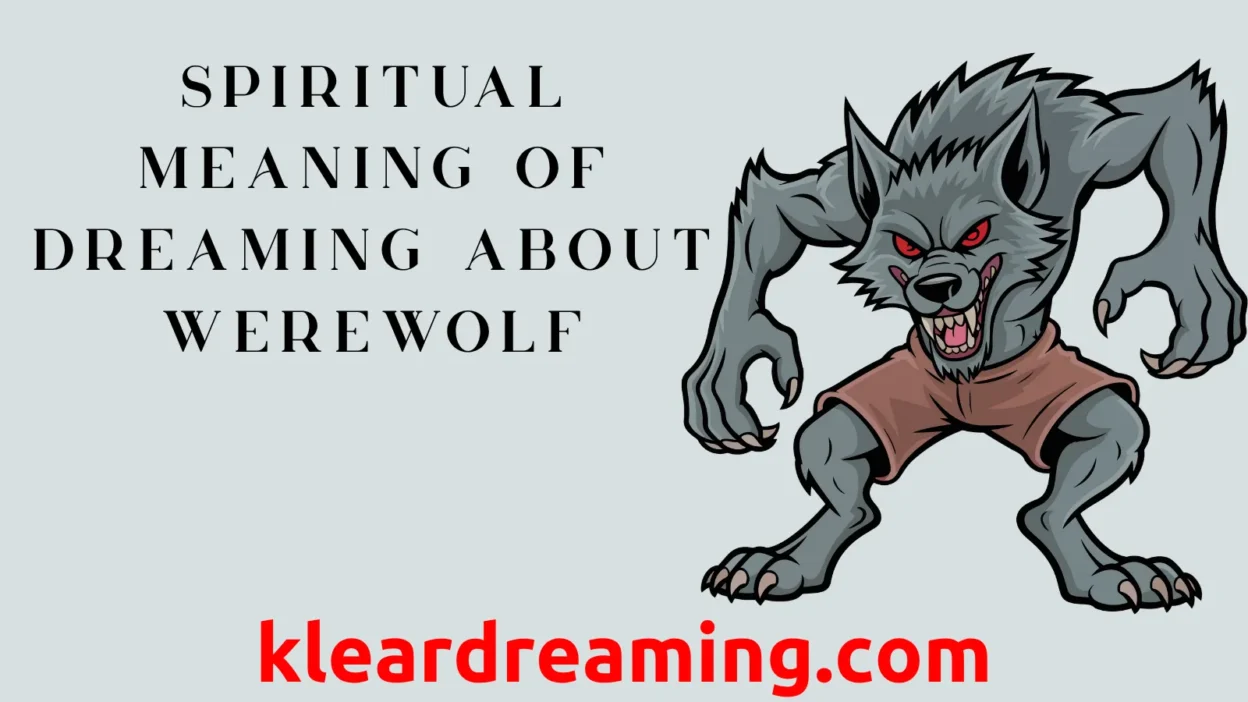Have you ever jolted awake, heart pounding, after witnessing a terrifying beast transform in your dream? What hidden messages might this lupine figure carry for your spiritual journey?
Dreams featuring werewolves are both captivating and unsettling, weaving together primal instincts, shadow aspects of the psyche, and spiritual symbolism. In this guide, we’ll decode the multifaceted meanings behind your werewolf dreams—drawing on biblical, psychological, cultural, and chakra-based perspectives—to help you integrate these nocturnal messages for growth and self-discovery.
Biblical Meaning of Werewolf in Dream
In biblical symbolism, wolves often represent danger, deception, or predatory forces (e.g., false prophets in sheep’s clothing). A werewolf—half-human, half-wolf—can signify a struggle between your higher self and base impulses. Dreaming of a werewolf might point to:
- Spiritual Testing: Like Job’s trials, you may face inner temptations that test your faith and integrity.
- Unrevealed Sin or Shadow: The beastly form suggests aspects of your character you’ve repressed or denied—anger, jealousy, or betrayal—that need confession and redemption.
- Divine Protection and Deliverance: If you survive or overcome the werewolf, it signals God’s safeguarding power, empowering you to stand firm against spiritual foes.
Reflect on Psalm 23’s assurance—“Even though I walk through the valley of the shadow of death, I will fear no evil”—as you discern which “shadow” the werewolf reveals in your life.
What Does It Mean When You Dream About Werewolves Attacking You
Being attacked by a werewolf in your dream often indicates:
- Confrontation with the Shadow Self: You’re grappling with unwanted impulses or emotions—rage, resentment, or grief—that feel uncontrollable.
- External Conflict: This may mirror real-life situations where you feel ambushed by someone’s hostility or betrayal.
- Call to Assert Boundaries: The dream urges you to stand your ground, whether in relationships, at work, or within your own mind.
Instead of running, invite the image: ask the werewolf what it wants. This journaling exercise can uncover the root of inner turmoil and guide you toward healing.
Being Chased by a Werewolf Dream Meaning
Being chased suggests avoidance—there’s something you’re running from:
- Unresolved Trauma: Past hurts you haven’t fully processed may resurface as a relentless pursuer.
- Fear of Transformation: You may sense impending change—career shifts, spiritual awakenings—but fear the loss of old identity.
- Emotional Suppression: Unexpressed anger or passion demands release; the werewolf chase is your psyche’s urgent call to acknowledge it.
Practice gentle confrontation: in waking life, set aside time for reflective solitude—meditation, prayer, or breathwork—and face the fear with compassion.
Black Werewolf Dream Meaning
Black in dreams often symbolizes the unknown, the unconscious, or shadow material. A black werewolf intensifies:
- Deep Shadow Work: You’re ready (or being forced) to explore the darkest corners of your psyche.
- Spiritual Tests in Darkness: Like Jacob wrestling with the angel at Peniel (Genesis 32), you must wrestle with unseen spiritual dynamics before dawn’s breakthrough.
- Potential for Growth: The black coat reminds that from soil’s darkness, seeds sprout—your hidden aspects can become strengths if acknowledged.
Envision shining a gentle light on the black fur—inviting awareness rather than banishing the beast—which transforms fear into understanding.
Running Away from Werewolf Dream
Running away reflects your instinct to escape discomfort rather than process it:
- Avoidance of Inner Work: You know confronting certain feelings is necessary but overwhelming.
- Resistance to Change: The beast symbolizes transformation; flight means resisting inevitable growth.
- Need for Safe Containers: You might require a supportive environment—therapist, spiritual mentor, or trusted friend—to face the beast.
Next time you dream you’re running, pause mid-dream. Visualize safe haven: a circle of light, a guardian figure. Build that sanctuary in waking life as you explore these themes.
Dreaming of Someone Turning into a Werewolf
Observing a friend or lover morph suggests:
- Perceived Betrayal or Hidden Nature: You may feel someone in your circle has an undisclosed side—anger, duplicity, or passion—surfacing now.
- Projection of Shadow: Traits you dislike in them might actually reside within you; the dream invites self-reflection.
- Transformation in Relationships: The relationship itself is evolving—perhaps from casual to intense, or harmonious to challenging.
Journal prompts: “What qualities did I notice in them? How do I feel about those qualities in myself?” This deepens empathy and self-understanding.
In a Dream I Was a Werewolf Lyrics
When you become the werewolf, the dream shifts perspective:
- Embracing Primal Power: You’re reconnecting with instinctual drives—creativity, sexuality, survival energy—that modern life often suppresses.
- Shadow Integration: You no longer flee from darker parts but inhabit them; it signals readiness to integrate your shadow.
- Warning of Unchecked Impulses: Conversely, losing control in wolf form may caution against letting passions run rampant.
Sing or write your own “wolf song” in waking life—expressive writing or drumming can help channel and balance your inner wildness.
Dream of Fighting a Werewolf
Combat in dreams is about inner struggle:
- Battle for Self-Mastery: You’re striving to master destructive impulses—anger, addiction, jealousy.
- Spiritual Warfare: The fight may symbolize prayers and practices shielding you from negative energies.
- Courage and Resilience: Victory, partial or uncertain, reveals your resilience and the need to cultivate discipline and faith.
Offer gratitude for your strength, then commit to daily practices—meditation, affirmations, spiritual readings—that fortify you against future “attacks.”
Werewolf Dream Meaning Islam
In Islamic dream interpretation, wolves often signify thieves or enemies. A werewolf may represent:
- Duality of the Soul: The nafs (ego) struggles with fitra (original purity). Transformation into a wolf warns of giving into base desires.
- Need for Tawbah (Repentance): The dream may call you back to prayer, charity, and remembrance of Allah.
- Protection through Dhikr: Reciting Ayat al-Kursi or morning/evening adhkar can shield you from negative influences manifesting as wolves.
Reflect on the Quranic reminder: “Indeed, the soul is prone to evil…” (Quran 12:53), and use it as motivation to purify your intentions.
White Werewolf Dream Meaning
White symbolizes purity, spiritual illumination, and higher consciousness:
- Integration of Shadow with Light: The wolf’s white fur suggests your darker traits are being transformed by spiritual insight.
- Divine Guidance: White signifies angelic or divine assistance guiding you through shadow work.
- Balance of Opposites: You’re achieving harmony between your instinctual nature and moral compass.
Meditate on the balance of yin and yang within you, envisioning light flowing into the wolf’s fur and grounding in your heart chakra.
Red Werewolf Dream Meaning
Red is the color of passion, vitality, but also warning:
- Surging Life Force: The dream channels intense energy—anger, desire, creativity—that demands expression.
- Alert to Emotional Wounds: Red fur may bleed, pointing to hurt that’s been ignored.
- Activation of Root Chakra: Your foundation is stirring; old fears (abandonment, safety) may surface.
Ground yourself in nature—walking barefoot, gardening, or drumming—to channel red’s vigor constructively.
Dream Symbolism: Psychology + Spiritual Side
From a psychological lens (Jungian perspective), the werewolf embodies the shadow archetype—hidden, primitive aspects of the self. Dreams urge integration of these parts for wholeness. Suppressing the shadow can lead to projection: seeing faults in others that actually lie within.
On the spiritual plane, the werewolf signifies the journey of transformation—akin to alchemical processes where lead (ego) turns into gold (spiritual maturity). The hairy beast in a psychic lab points to transmutation: encountering and embracing your darker nature to emerge enlightened. Rituals—like guided shamanic journeys—can safely navigate these inner realms.
Cultural Dream Interpretations
Across cultures, werewolves resonate differently:
- European Folklore: Symbol of curse, moral transgression, and lunar cycles—linking human behavior to cosmic rhythms.
- Native American Traditions: Skin-walkers, shape-shifters rooted in ancestral power and warnings against misuse of spiritual gifts.
- Modern Pop Culture: Themes of duality, suppressed rage, and the thin line between civilization and wilderness.
Understanding these contexts enriches your dream work—seeing your werewolf as both ancient guardian and misused power.
Connection to Chakras or Emotional Blockages
Werewolf dreams often point to chakra imbalances:
- Root Chakra (Red Werewolf): Fear, instability, survival anxieties—work with grounding yoga, earthing, and affirmations: “I am safe.”
- Sacral Chakra (Black/Brown Hues): Suppressed creativity, guilt around pleasure—engage in dance, art, and water-based healing.
- Solar Plexus (Yellow or Radiant White): Personal power and shadow anger—practice core-strengthening exercises and empower self-talk.
- Heart Chakra (White Werewolf): Integrating shadow with love—use loving-kindness meditation to soften edges.
Mapping your werewolf’s color, behavior, and location in the dream to chakra centers accelerates emotional healing.
Real-Life Examples of This Dream Experience
- Maria’s Transformation: A corporate lawyer plagued by aggressive werewolf chase dreams began painting in secret, channeling her suppressed passion. Her creativity flourished, and the dreams ceased.
- Daniel’s Shadow Work: After recurrent dreams of fighting a red-furred wolf, he sought therapy to address deep-seated anger toward his father. Through healing, he reported dreams of “tamed” white wolves guiding him.
- Aisha’s Spiritual Awakening: Experiencing an Islamic werewolf dream, she intensified her dhikr and charitable acts. The recurring nightmares turned into peaceful visions of a white wolf under the moon.
These stories reveal that werewolf dreams can be catalysts for profound life shifts when observed and integrated.
FAQs
1. Are werewolf dreams always negative?
Not necessarily. While they often spotlight shadow material, overcoming or befriending the beast can signal empowerment and healing.
2. Why do werewolf dreams often occur during full moons?
Full moons amplify unconscious content—our mind is more open to lunar cycles, heightening instinctual and emotional energies tied to the subconscious.
3. Can dreaming of a werewolf predict real-life danger?
Rarely in the literal sense. It more likely warns of “psychic” threats—unhealthy relationships, self-sabotaging patterns, or ignored emotions.
4. How can I change a nightmare about werewolves into a positive dream?
Practice lucid dreaming techniques: set intentions before sleep, visualize confronting or transforming the wolf, and affirm your mastery in dream journaling.
5. Should I seek professional help if I keep dreaming about werewolves?
If the dreams cause significant distress or interfere with daily life, a therapist—or spiritual counselor—can guide you through safe shadow integration.
Closing
Dreams of werewolves invite you into the depths of your psyche, where light and shadow dance under the lunar glow. These visions are neither curses nor mere nightmares—they are sacred invitations to embrace your fullness.
Reflection Practice: Each morning, journal the emotions the wolf stirs in you. Ask: “What wisdom does this beast bring?” Over time, you’ll find the wolf transforms from fearsome foe into wise guide, illuminating your path toward balance, courage, and soulful awakening.



